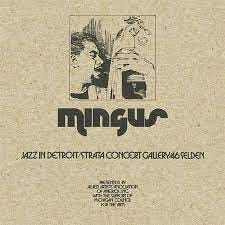For Record Store Day: Mingus Live at Ronnie Scott's
A beautifully detailed new addition to the discography
When Charles Mingus got his band revving at its most interactive gear, the music transcended, and almost mocked, any fixed date stamp. The recording might have happened in 1956, or 1963, or 1972, but the music celebrated the jazz impulse across decades – sweeping together New Orleans marches and elegant piano trios, the boilermakers thrown by big-band brass sections in the swing era and the plateauing, unresolved quests of 1960s avant-garde firebrands.
And the history, however artfully recombined, wasn’t even the main point: With Mingus, what registers first is the pursuit of nextness, an intentional openness to expression as it is shaped in the moment. Nothing feels rote, or canned, or perfunctory in Mingus’ sprawl. The bassist and composer regarded improvisation as a transformative act; part of his art was designing skeletal, deceptively melodic settings that allowed he and his accomplices to look forward and backward at once, settings in which his particular time-bending spontaneity could flourish. He made his sidemen true believers in this cause by involving them in rousing journeys from whisper to scream and back. Mingus didn’t have to verbalize or “teach” his aesthetic; all it took was a few of those kinetic episodes to spread it across the bandstand and into the audience.
This is audible on an astonishingly crisp recording from 1972 that’s one among the gazillions of discoveries and rare titles dropping this Friday for Record Store Day. The Lost Album From Ronnie Scott’s, issued by archive-oriented Resonance Records, is a lavish 3-LP package on heavy vinyl. Its booklet offers rare Mingus photographs and insights on the jazz titan’s work from many perspectives; among the voices are clubowner and saxophonist Ronnie Scott and bassist Christian McBride.
According to the notes, The Lost Album From Ronnie Scott’s was recorded over two nights in August 1972; it was captured with professional equipment and slated for release by Columbia Records as the followup to Let My Children Hear Music. Before the live work could see daylight, Mingus was dropped by Columbia – part of a “jazz purge” orchestrated by label honcho Clive Davis, who pink-slipped Keith Jarrett and Ornette Coleman at the same time. That was not a good day for creativity in the music business.
Maybe Davis didn’t hear commercial prospects in the tunes Mingus played at Ronnie Scott’s, with a five-piece band including frequent collaborators drummer Roy Brooks and alto saxophonist Charles McPherson as well as a newcomer, 19-year-old trumpeter Jon Faddis. Many of the tunes stretched beyond 20 minutes – one medley, “Orange Was the Color of Her Dress, Then Silk Blues,” lasts over 30 minutes. There are some drifty moments, and some solos that wander on a bit too long – including Brooks’ eerie, vocalese-style feature on the musical saw.
Take the ride, though. Just to hear Brooks’ instinctual, almost instantaneous reactions -- and to get right next to his texture-rich and deftly understated timekeeping with brushes. And to hear Mingus, who had returned to performance in 1971 after an illness and extended hiatus, creating a wide, luxurious, quintessentially swinging walking cadence – and then capriciously switching it up, implying double-time or weirder subdivisions in response to the soloists. And to experience the thrillingly patient medium-tempo romp called “Noddin’ Ya Head Blues,” which begins with Mingus by himself, twisting and stretching ageless blues phrases into a hypnotic modern language he’s assembling on the spot.
Mingus’ bands from this late period didn’t always reach the torrid heights of his legendary ‘60s groups. So what? There’s plenty going on inside the music here – and on the sonically inferior 1973 find Live In Detroit/Strata Concert Gallery featuring pianist Don Pullen, which was released in 2018.
These tell of a time when jazz was beginning its long decline in terms of cultural prominence but was still steadfastly evolving as art. Mingus’ work during this time was part of that evolution, and perhaps more central to it than his discography of the period indicates. The Lost Album is not a classic Mingus album from start to finish, but it is a living breathing celebration of the Mingus aesthetic. It reminds that the bassist treated his groups as laboratories more than finishing schools: He got players locked onto his frequency and immersed in his mission. Just by the way he played, he drew them into fast-evolving conversations that land on Louis Armstrong one minute and late John Coltrane the next, with no whiplash in the transitions.
Why yes, we have a fancy digital suggestion box. Share your favorite Underloved/Overlooked records here: echolocatormusic@gmail.com.
Please consider subscribing (it’s still free!). And…..please spread the word! (This only works via word of mouth!).








Thanx!! I attended one of the shows & was furious by Davis’dropping Charlie-never thought I’d get the chance to revisit!!